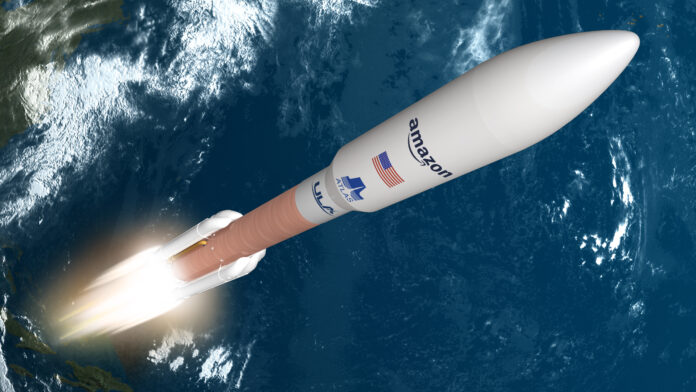Amazon launched the first 27 satellites of its Project Kuiper broadband internet constellation into space from Florida on Monday, marking the start of a long-anticipated deployment of its satellite internet network aimed at competing with SpaceX’s Starlink.
The launch initiates the deployment of what will eventually be a 3,236-satellite system in low-Earth orbit, part of a $10 billion project announced in 2019 to deliver global broadband service to consumers, businesses, and governments.
The satellites were launched aboard an Atlas V rocket, provided by United Launch Alliance, a joint venture between Boeing and Lockheed Martin. The launch took place at 7 p.m. EDT from Cape Canaveral Space Force Station. An earlier attempt on April 9 was canceled due to bad weather.
Project Kuiper represents Amazon’s most ambitious venture in the space sector, positioning it against dominant players like Starlink and traditional telecommunications providers such as AT&T and T-Mobile. The company is targeting underserved areas with limited or no internet access, describing the service as a tool to close the connectivity gap in rural regions.
Amazon had initially planned to begin satellite deployment in early 2024, but the mission experienced more than a year of delay. The company is required to deploy half of its satellite constellation—1,618 satellites—by mid-2026 under a timeline set by the U.S. Federal Communications Commission. Amazon launched two prototype satellites in 2023 and successfully de-orbited them in 2024.
Following Monday’s launch, Amazon is expected to confirm contact with the satellites from its mission operations center in Redmond, Washington, within hours or days. If successful, the company aims to begin offering internet service to customers later this year. According to prior filings, Amazon could initiate coverage in northern and southern regions once 578 satellites are in orbit, with expansion toward the equator as more satellites are deployed.
Amazon has said that up to five additional Kuiper missions could be launched by United Launch Alliance in 2025. In 2022, the company secured 83 rocket launches from ULA, Arianespace, and Blue Origin—its founder Jeff Bezos’ space company—in what it described as the industry’s largest commercial launch agreement to date.
Despite entering the market later than Starlink, Amazon believes its extensive experience in consumer products and cloud computing offers it a competitive advantage. Bezos has expressed optimism about Project Kuiper’s future, noting that growing global demand for internet access leaves room for multiple successful players. He also acknowledged the potential for defense-related applications of low-Earth orbit satellite systems.
In 2023, Amazon unveiled its Kuiper consumer terminals, including a primary antenna the size of an LP vinyl record and a smaller version comparable in size to its Kindle e-reader. The company plans to manufacture tens of millions of the devices at a price point below $400 each.






















